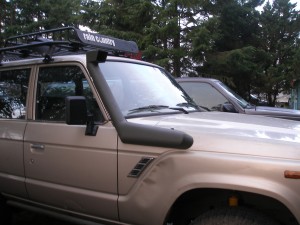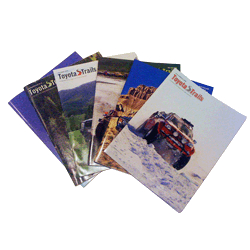By Tony K
 If you really want to drive yourself crazy take a quick search on the internet. You will find tests and studies that all point out that your chosen filter is the best at what it does. So in the end much of it comes down to just what you prefer to run in your rig. Mainly paper or cotton along with a few variables thrown in to make things truly confusing. Or throw in the fact that what we call paper filters are not really paper… I am just going to call them paper to differentiate them from reusable filters.
If you really want to drive yourself crazy take a quick search on the internet. You will find tests and studies that all point out that your chosen filter is the best at what it does. So in the end much of it comes down to just what you prefer to run in your rig. Mainly paper or cotton along with a few variables thrown in to make things truly confusing. Or throw in the fact that what we call paper filters are not really paper… I am just going to call them paper to differentiate them from reusable filters.
-Air Flow-
Paper filters flow just fine right up the the point they are dirty… Then your only option is replacement, not so good if you are on an extended trip without spares. If you do use paper it would be wise to carry an extra. This is where oiled cotton filters excel because it takes a massive amount of dirt to accumulate on the filter media before any noticeable restriction occurs. More than likely even in an incredibly dirty environment you will not have a problem with an oiled cotton filter while you may clog up a paper filter in a hurry. And believe me I have been places that would eat a paper filter for breakfast…
–Filtration-
These tests are just as confusing as the flow tests. Bottom line is that they all pretty much filter out the same size of particulates. Typically in the range of 4-6 microns if you are a numbers guy. For comparison a human hair is typically 50 microns. So we are not talking about very big particles when it comes down to it. I have also seen it mentioned that the particles that actually do damage to your engine are typically in the 10-20 micron range. So as long as the filter removes this size particle you are not likely to experience any sort of engine wear with either filter type. And can anyone tell me if those tiny particles that do get by are destroyed by the combustion of the motor? How many are just passed through the cylinder and expelled in the exhaust?
There is not a drastic difference in the amount of particles that get by any one of the types of filters that isn’t far below a limit considered acceptable by the engine manufacturers. I recently came across a test in an Australian magazine that showed a factory Toyota filter and a K&N let in the same amounts of particles, and both were about 5 times lower than what was considered acceptable limits.
But there is a significant advantage to an oiled cotton filter as it gets dirty. I don’t know why or how but as it gets dirty the filtration capabilities actually improve. Breathing respirators also get this way as the dirt piles up on the dust filter, I have to go through testing every year and this is a point continually mentioned by the rep from 3M. It’s continues to get better right up until it is clogged, meaning no air will pass through it.
But the important thing to remember is that this point, where it no longer will allow air to pass, takes far longer to reach than a paper filter. And the whole time it is getting more efficient at removing particulates. Paper filters on the other hand start clogging up the day you install them. Having an oiled cotton filter may just get you home without fear of damaging your engine.
-Service Intervals-
Both main types of filters work just fine in your rig. It all comes down to how much money you want to spend and how often you like to service your air filter. Paper filters typically only last about 10,000 miles and time for a new one. My K&N is good for 50,000 and all I have to do is wash and re oil it. Over the life of your motor the oiled cotton is going to save you money. Nor should you forget that in a dusty dirty environment these intervals should be much more often.
-Bottom Line-
I really don’t like the use it and throw away mentality that goes with paper filters. I have used oiled cotton filters for years with no ill effects to my rigs. And off road in a dirty environment the oiled cotton has the advantage as far as I am concerned. I have spent days in an environment that would have easily clogged up a paper filter in a day or two, not ideal if you are into long trips on the trail.
There are also things you can do to prolong the life of your filter. A snorkel helps get the source of air away from the inside of the grill and up off the road. You may also find that a centrifugal pre-cleaner or a pre-filter can also be a help in a dirty environment.

